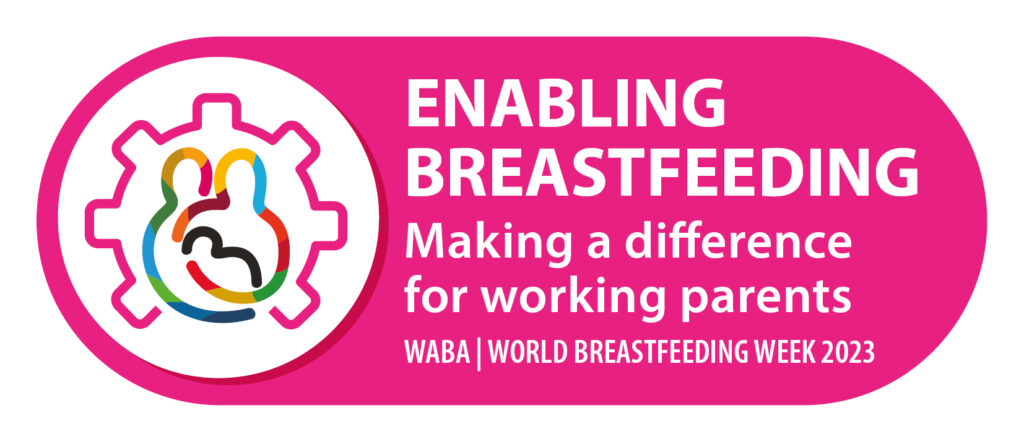World Breastfeeding Week and National Breastfeeding Month are around the corner! This August, we’re looking forward to once again coming together as a community to celebrate.
- August 2023: National Breastfeeding Month
- Theme for the Month: “This is Our Why”
- National Breastfeeding Month Weekly Observances
- August 1-7, 2023: World Breastfeeding Week
- Theme: “Empower Parents – ENABLING BREASTFEEDING”
- August 8-14: Indigenous Milk Medicine Week
- August Week 3: To Be Announced
- August 25-31: Black Breastfeeding Week
- August 1-7, 2023: World Breastfeeding Week
We are excited to share with you the theme for World Breastfeeding Week 2023, which is “Empower Parents – ENABLING BREASTFEEDING – Making a difference for working parents.” The theme for the month will help shine a light on why this work is so important and center the conversation on the babies and families who need our support. The focus of these themes are to showcase the impact of paid leave, workplace support, and emerging parenting norms on breastfeeding through the lens of parents themselves.
As our valued community partner, we wanted to engage with you and find out how you plan to celebrate National Breastfeeding Month and support breastfeeding families in your community.
Tell Us How You Are Celebrating!
We believe that businesses and organizations play a vital role in helping nursing families feel welcome in their communities. By going beyond allowing breastfeeding to welcoming breastfeeding, we can make a significant difference in the lives of nursing families.
To support this effort, we invite you to use the following hashtags in all your social media interactions:
#WBW2023
#WABA
#EmpoweringParentsCampaign
#EnablingBreastfeeding
We also want to share with you the objectives of #WBW2023:
- Inform people about working parents’ perspectives on breastfeeding and parenting
- Anchor optimal paid leave and workplace support as important tools to enable breastfeeding
- Engage with individuals and organizations to enhance collaboration and support for breastfeeding at work
- Galvanize action on improving working conditions and relevant support for breastfeeding
Inform
It is important to understand the challenges that working parents face when it comes to breastfeeding and parenting. By informing people about working parents’ perspectives on breastfeeding and parenting, we can raise awareness about the importance of workplace support and paid leave to enable breastfeeding. This will help us to build more supportive and inclusive environments for breastfeeding families in our communities.
- Host a panel discussion: The community coalition can host a panel discussion that brings together working parents, healthcare providers, lactation consultants, and other stakeholders to share their perspectives on breastfeeding and parenting in the workplace. This can be done virtually or in-person and can be recorded and shared online to reach a wider audience.
- Engage with local media: The community coalition can engage with local media to raise awareness about working parents’ perspectives on breastfeeding and parenting. This can be done by submitting op-eds, letters to the editor, or press releases that highlight the importance of workplace support and paid leave for breastfeeding families.
- Partner with local businesses: The community coalition can partner with local businesses to promote breastfeeding-friendly environments in the workplace. This can include providing training and education to employers and employees, advocating for policies that support breastfeeding, and providing resources and support to help working parents continue breastfeeding their babies.
Anchor
Paid leave and workplace support are crucial tools that enable breastfeeding for working parents. By providing optimal paid leave and workplace support, businesses and organizations can create a breastfeeding-friendly environment that helps working parents to continue breastfeeding their babies. This includes providing lactation accommodations, flexible work arrangements, and support for pumping and storing breast milk.
To anchor optimal paid leave and workplace support as important tools to enable breastfeeding in the community, local community advocates can take the following steps:
- Provide resources and support to employers: Local community advocates can provide resources and support to employers to help them create breastfeeding-friendly environments in the workplace. This can include providing information on lactation accommodations, flexible work arrangements, and support for pumping and storing breast milk.
- Encourage employers to adopt family-friendly policies: Local community advocates can encourage employers to adopt family-friendly policies, such as paid leave and flexible work arrangements, that support breastfeeding and other family responsibilities.
- Promote paid leave and workplace support in the community: Local community advocates can promote the importance of paid leave and workplace support for breastfeeding families through community events, social media campaigns, and other outreach efforts.
By taking these steps, local community advocates can anchor optimal paid leave and workplace support as important tools to enable breastfeeding in the community. This can lead to healthier and happier families and communities that value and support breastfeeding.
Engage
Collaboration and support are essential to promoting and sustaining breastfeeding in the workplace. By engaging with individuals and organizations, we can create a network of support that helps working parents to feel comfortable and confident when breastfeeding at work. This includes partnering with healthcare providers, lactation consultants, and other organizations that promote breastfeeding and providing training and education to employers and employees.
Engage with individuals and organizations to enhance collaboration and support for breastfeeding at work, local community organizations can take the following steps:
- Partner with local businesses and organizations: These organizations can partner with local businesses and organizations to promote breastfeeding-friendly environments in the workplace. This can include providing training and education to employers and employees, advocating for policies that support breastfeeding, and providing resources and support to help working parents continue breastfeeding their babies.
- Engage with healthcare providers: Local community organizations can engage with healthcare providers, such as lactation consultants and pediatricians, to promote and support breastfeeding in the workplace. They can also provide resources and support to healthcare providers to help them better support working parents who are breastfeeding.
- Utilize social media and online resources: Local community organizations can use social media and online resources to promote breastfeeding-friendly environments in the workplace. They can create social media campaigns, share educational materials and resources, and connect with other organizations that are working to promote and support breastfeeding in the workplace.
Overall, by engaging with individuals and organizations, local community organizations can help to enhance collaboration and support for breastfeeding in the workplace, which can ultimately lead to healthier and happier families and communities.
Galvanize
Improving working conditions and relevant support for breastfeeding is a collective effort that requires action from all stakeholders. By galvanizing action on improving working conditions and relevant support for breastfeeding, we can create a culture of support for breastfeeding families in our communities. This includes advocating for policies that support breastfeeding, providing resources and support to employers, and promoting breastfeeding-friendly environments in the workplace.
To galvanize action on improving working conditions and relevant support for breastfeeding in the community, local community advocates can take the following steps:
- Advocate for policies that support breastfeeding: Local community advocates can work with policymakers to advocate for policies that support breastfeeding in the workplace, such as paid parental leave, lactation accommodations, and flexible work arrangements. This can include advocating for local ordinances, state laws, and federal legislation that support breastfeeding.
- Promote breastfeeding-friendly environments in the workplace: Local community advocates can work with employers to promote breastfeeding-friendly environments in the workplace by providing education and training on breastfeeding and workplace support, creating lactation rooms, and implementing policies that support breastfeeding.
- Engage with the community: Local community advocates can engage with the community to raise awareness about the importance of breastfeeding and workplace support. This can include hosting community events, social media campaigns, and other outreach efforts to educate and engage community members.
By taking these steps, local community advocates can galvanize action on improving working conditions and support for breastfeeding, which can ultimately lead to healthier and more supportive communities for breastfeeding families.
Thank you for your support.
We want to thank you for your commitment to supporting breastfeeding families in your community. We hope that you will join us in celebrating National Breastfeeding Month and supporting breastfeeding families in your community.
Please do not hesitate to contact us with any feedback or questions.

